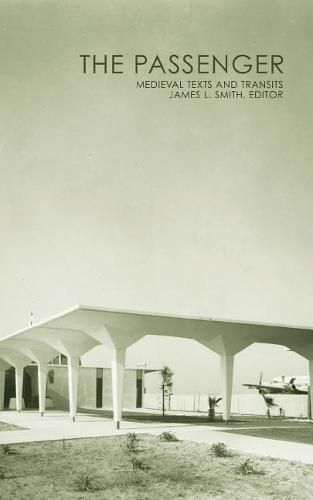Readings Newsletter
Become a Readings Member to make your shopping experience even easier.
Sign in or sign up for free!
You’re not far away from qualifying for FREE standard shipping within Australia
You’ve qualified for FREE standard shipping within Australia
The cart is loading…






What strange transactions take place in the mobile spaces between loci? How does the flow of forces between fixed points enliven texts, suggest new connections, and map out the dizzying motion of myriad interactions? The essays in this volume were first presented at the 2014 New Chaucer Society Congress in Reykjavik, Iceland where a meeting of minds in a shared intermediate space initiated dialogue from diverse perspectives and wended its way through the invisible spaces between concrete categories, objects, and entities.The resulting volume asks a core question: what can we learn by tarrying at the nexus points and hubs through which things move in and out of texts, attempting to trace not the things themselves or their supposedly stable significations, but rather their forms of emergence and retreat, of disorder and disequilibrium? The answer is complex and intermediate, for we ourselves are emerging and retreating within our own systems of transit and experiencing our own disequilibrium. Scholarship, like transit, is never complete and yet never congeals into inertia.
Through the manifold explorations of the dynamic transit, transports, scapes, and flows found within literary-and Chaucerian-thought-worlds, new vistas of motion and motivation emerge. Following John Urry’s mobile sociology, the volume advances the notion that we can no longer view either social worlds or textual worlds as uniform surfaces upon which one can trace or write a history of the horizontal movements of humans and human mentalities; rather, everything is in constant motion: objects, images, information/ideas, and mobility is thus also vertical, involving human and non-human actants.
The essays in this volume consider, then, how medieval literary texts in Chaucer’s period rewarp time and space by the means of sophisticated transit and transport structures, which might be traced within specific works but also across works, such as in text networks. Motive entities within literature twist and turn, interact and collide, and destabilise predictable trajectories with unpredictable vigor.
TABLE OF CONTENTS // James L. Smith, Introduction: Transport, Scape, Flow: Medieval Transit Systems - Christopher Roman, Bios in The Prik of Conscience: The Apophatic Body and the Sensuous Soul - Jennie Friedrich, Concordia discors: The Traveling Heart as Foreign Object in Chaucer’s Troilus and Criseyde - Robert Stanton, Whan I schal passyn hens: Moving With/In The Book of Margery Kempe - Carolynn Van Dyke, Animal Vehicles: Mobility beyond Metaphor - Sarah Breckenridge Wright, Building Bridges to Canterbury - Thomas R. Schneider, Chaucer’s Physics: Motion in The House of Fame
$9.00 standard shipping within Australia
FREE standard shipping within Australia for orders over $100.00
Express & International shipping calculated at checkout
Stock availability can be subject to change without notice. We recommend calling the shop or contacting our online team to check availability of low stock items. Please see our Shopping Online page for more details.
What strange transactions take place in the mobile spaces between loci? How does the flow of forces between fixed points enliven texts, suggest new connections, and map out the dizzying motion of myriad interactions? The essays in this volume were first presented at the 2014 New Chaucer Society Congress in Reykjavik, Iceland where a meeting of minds in a shared intermediate space initiated dialogue from diverse perspectives and wended its way through the invisible spaces between concrete categories, objects, and entities.The resulting volume asks a core question: what can we learn by tarrying at the nexus points and hubs through which things move in and out of texts, attempting to trace not the things themselves or their supposedly stable significations, but rather their forms of emergence and retreat, of disorder and disequilibrium? The answer is complex and intermediate, for we ourselves are emerging and retreating within our own systems of transit and experiencing our own disequilibrium. Scholarship, like transit, is never complete and yet never congeals into inertia.
Through the manifold explorations of the dynamic transit, transports, scapes, and flows found within literary-and Chaucerian-thought-worlds, new vistas of motion and motivation emerge. Following John Urry’s mobile sociology, the volume advances the notion that we can no longer view either social worlds or textual worlds as uniform surfaces upon which one can trace or write a history of the horizontal movements of humans and human mentalities; rather, everything is in constant motion: objects, images, information/ideas, and mobility is thus also vertical, involving human and non-human actants.
The essays in this volume consider, then, how medieval literary texts in Chaucer’s period rewarp time and space by the means of sophisticated transit and transport structures, which might be traced within specific works but also across works, such as in text networks. Motive entities within literature twist and turn, interact and collide, and destabilise predictable trajectories with unpredictable vigor.
TABLE OF CONTENTS // James L. Smith, Introduction: Transport, Scape, Flow: Medieval Transit Systems - Christopher Roman, Bios in The Prik of Conscience: The Apophatic Body and the Sensuous Soul - Jennie Friedrich, Concordia discors: The Traveling Heart as Foreign Object in Chaucer’s Troilus and Criseyde - Robert Stanton, Whan I schal passyn hens: Moving With/In The Book of Margery Kempe - Carolynn Van Dyke, Animal Vehicles: Mobility beyond Metaphor - Sarah Breckenridge Wright, Building Bridges to Canterbury - Thomas R. Schneider, Chaucer’s Physics: Motion in The House of Fame